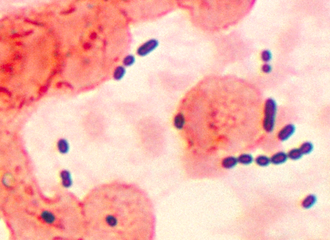Enterococcaceae

Enterococcaceae is a family of Gram-positive bacteria that is a significant part of the lactic acid bacteria group. Members of this family are known for their role in various fermentation processes and for their presence in the gastrointestinal tract of humans and animals, where they play a crucial role in maintaining the health of the host. However, some species within this family, particularly those belonging to the genus Enterococcus, have gained notoriety as pathogens responsible for hospital-acquired infections.
Characteristics[edit]
Enterococcaceae are characterized by their ability to survive in harsh conditions, such as high salt concentrations, extreme pH levels, and high temperatures. This resilience contributes to their ubiquity in various environments, including soil, water, and food products, in addition to the gastrointestinal tract of animals. They are facultatively anaerobic, meaning they can grow in the presence or absence of oxygen, and they are non-spore-forming. The cell wall of Enterococcaceae contains a thick layer of peptidoglycan, typical of Gram-positive bacteria, which contributes to their ability to resist adverse conditions.
Genus and Species[edit]
The most well-known genus within the Enterococcaceae family is Enterococcus. This genus includes several species, such as Enterococcus faecalis and Enterococcus faecium, which are commonly found in the human gut. These species are of particular clinical importance due to their role in nosocomial infections, including urinary tract infections, bacteremia, and endocarditis. The ability of these bacteria to acquire and disseminate antibiotic resistance genes has made the treatment of infections caused by Enterococcus species increasingly challenging.
Clinical Significance[edit]
Enterococcaceae, particularly the Enterococcus species, are notable for their role in hospital-acquired infections. Their intrinsic resistance to many commonly used antibiotics, such as cephalosporins and low-level resistance to aminoglycosides, complicates treatment strategies. The emergence of vancomycin-resistant enterococci (VRE) has posed a significant challenge in healthcare settings, leading to the need for stringent infection control measures and the development of new antimicrobial agents.
Environmental and Industrial Relevance[edit]
Beyond their clinical significance, Enterococcaceae are also involved in various fermentation processes, contributing to the production of fermented foods and beverages. Their enzymatic activities are exploited in the dairy industry for the production of cheese and yogurt, where they contribute to flavor development and textural properties.
Conclusion[edit]
The Enterococcaceae family encompasses a diverse group of bacteria that play significant roles in health, disease, and industry. While their presence in the human gut is essential for maintaining a healthy microbiome, their ability to cause severe infections and acquire resistance to antibiotics poses a significant challenge to public health. Ongoing research is focused on understanding the mechanisms of antibiotic resistance in these bacteria and developing effective strategies for treating infections caused by multidrug-resistant Enterococcus species.
| This article is a stub. You can help WikiMD by registering to expand it. |
Ad. Transform your life with W8MD's Budget GLP-1 injections from $75


W8MD offers a medical weight loss program to lose weight in Philadelphia. Our physician-supervised medical weight loss provides:
- Weight loss injections in NYC (generic and brand names):
- Zepbound / Mounjaro, Wegovy / Ozempic, Saxenda
- Most insurances accepted or discounted self-pay rates. We will obtain insurance prior authorizations if needed.
- Generic GLP1 weight loss injections from $75 for the starting dose.
- Also offer prescription weight loss medications including Phentermine, Qsymia, Diethylpropion, Contrave etc.
NYC weight loss doctor appointmentsNYC weight loss doctor appointments
Start your NYC weight loss journey today at our NYC medical weight loss and Philadelphia medical weight loss clinics.
- Call 718-946-5500 to lose weight in NYC or for medical weight loss in Philadelphia 215-676-2334.
- Tags:NYC medical weight loss, Philadelphia lose weight Zepbound NYC, Budget GLP1 weight loss injections, Wegovy Philadelphia, Wegovy NYC, Philadelphia medical weight loss, Brookly weight loss and Wegovy NYC
|
WikiMD's Wellness Encyclopedia |
| Let Food Be Thy Medicine Medicine Thy Food - Hippocrates |
Medical Disclaimer: WikiMD is not a substitute for professional medical advice. The information on WikiMD is provided as an information resource only, may be incorrect, outdated or misleading, and is not to be used or relied on for any diagnostic or treatment purposes. Please consult your health care provider before making any healthcare decisions or for guidance about a specific medical condition. WikiMD expressly disclaims responsibility, and shall have no liability, for any damages, loss, injury, or liability whatsoever suffered as a result of your reliance on the information contained in this site. By visiting this site you agree to the foregoing terms and conditions, which may from time to time be changed or supplemented by WikiMD. If you do not agree to the foregoing terms and conditions, you should not enter or use this site. See full disclaimer.
Credits:Most images are courtesy of Wikimedia commons, and templates, categories Wikipedia, licensed under CC BY SA or similar.
Translate this page: - East Asian
中文,
日本,
한국어,
South Asian
हिन्दी,
தமிழ்,
తెలుగు,
Urdu,
ಕನ್ನಡ,
Southeast Asian
Indonesian,
Vietnamese,
Thai,
မြန်မာဘာသာ,
বাংলা
European
español,
Deutsch,
français,
Greek,
português do Brasil,
polski,
română,
русский,
Nederlands,
norsk,
svenska,
suomi,
Italian
Middle Eastern & African
عربى,
Turkish,
Persian,
Hebrew,
Afrikaans,
isiZulu,
Kiswahili,
Other
Bulgarian,
Hungarian,
Czech,
Swedish,
മലയാളം,
मराठी,
ਪੰਜਾਬੀ,
ગુજરાતી,
Portuguese,
Ukrainian